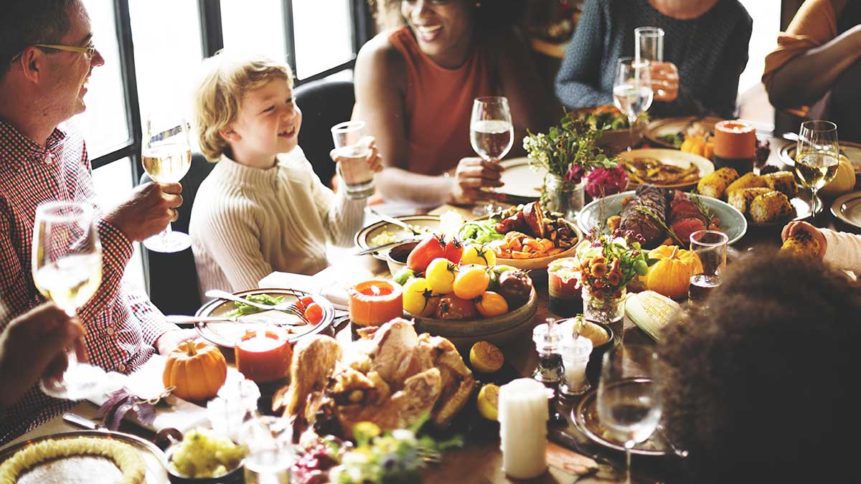
Deck your private hell with boughs of holly! The holiday season is upon us, and it can be excruciating for anyone dealing with infertility. With the gatherings and chatter and glitter, and with the focus so often on children and family, the Thanksgiving-to-Christmas-to-New Year trifecta can feel like a series of events designed to highlight what you lack.
Of course, many people cherish these traditions, and I am all for the joy of coming together. Yet it’s also true that there’s no place for grief in the social spaces typical to these celebrations. I wish there was the option to show up wearing a white flag, or, something that means, I’ve surrendered and I’m here, but I’m also somewhere else.
This coming holiday season, the twins that my husband Ken and I conceived through IVF will be nearly six years old. Still, I vividly remember the year that I was barely holding together a fragile presence at the Thanksgiving table, clutching a goblet of wine while my abdomen cramped with yet another round of unwelcome menstrual bleeding. Each pulse of pain reminded me that once again, I’d failed to get pregnant. I’d hauled my tired body to my aunt-in-law’s house, but my mind drifted over my doctor’s difficult advice: “Whatever you do, don’t cry when you get your period.” As if from a great distance, I heard my cousins make silly chit-chat, riffing about words they disliked.
I didn’t want pity, condolences, or worst of all, advice. I didn’t want to hear the story of how so-and-so finally relaxed and then boom—out came the baby!“I hate the word ‘luncheon,’” one said.
“What about the word ‘moist?’” someone countered.
“Ew,” the first agreed, affecting a shiver.
I thought to myself, I hate the word “fertility.” It sounded to me like a poison flower. But I didn’t say a thing. That would evoke the other word I hated: “infertility.” The events that saturated my thoughts could not be discussed. I couldn’t say, hey, I’m hemorrhaging a bucket of blood, and I might slump off this chair and just die. Rather I stirred the sweet potatoes on my plate, and offered small smiles. The moment rendered me speechless, a hapless contributor to the big silence that surrounds infertility.
I grasped Ken’s hand beneath the table, felt the solid warmth of his palm and fingers. By then my husband and I had been trying to conceive for over eighteen months—triple the amount of time that qualified me for the “infertility” diagnosis at my age. Still, I resisted it.
It wasn’t shame that kept me quiet about this fact, at least not in a straightforward way. I couldn’t speak about infertility because as someone whose tears rise quickly, frankness meant either uncorking my sadness, stress and fear completely, or painfully expending tremendous effort to squelch them. Better to float above and avoid the topic entirely. I didn’t want pity, condolences, or worst of all, advice. I didn’t want to hear the story of how so-and-so finally relaxed and then boom—out came the baby! All it took was a deep breath! Or how the dentist’s daughter’s sister had chosen to adopt.
The uncertainty of infertility also girds its silencing power. The hope tightrope wobbles beneath your feet, and cuts you as you fall. Then every month you climb back up, because one time, you might make it across. Our culture likes to celebrate the idea that if you are courageous, if you try, if you endure, things will work out. I want that justice too, even now, even as I’ve come to know that so many times, that isn’t quite how it goes.
Finally, here is the least speakable aspect of infertility: it’s an experience that happens in a specific, invasive way to your physical being. You are trying to help your body to do something, but it can feel like you are trying to force your body to do something. That is a fundamentally solitary experience. It’s also confusing. Medical treatment for infertility is a privilege not available to everyone, a cherished chance. I am firmly of the belief that high-tech intervention is as sacred as nature. At the same time, the very thing you seek for a blessing creates a sideshow of trauma, and trauma finds no space between the cranberries and the pumpkin pie.
After the holiday meal, as soon as Ken and I were alone together in the car mercifully heading home, we began to talk about our real lives—this next medical pit-stop in our baby-making odyssey.So, back at that Thanksgiving dinner—I didn’t embrace the word “infertility,” or utter it for the list of dissonant terms at the table. Instead I sensed its cruel presence settling in, the way you reach a point in winter when the days are so short that you know you’re in for a span of darkness.
My period meant that the very next day, I’d go in for the blood test that would kick off my “Clomid challenge”—a phrase Ken and I had mocked in deep voices as a means of fending off fear. I had the dreaded bottle of pills, and I accurately sensed that this drug and its intense side effects wouldn’t sit well with my already volatile feelingscape. Still, I had to try.
After the holiday meal, as soon as Ken and I were alone together in the car mercifully heading home, we began to talk about our real lives—this next medical pit-stop in our baby-making odyssey.
“Why do they call it a ‘Clomid challenge’?” I complained.
“I know I’m going to fail.” The wine I’d drunk hadn’t sparked optimism.
Ken tried a pep talk. “It’s like any challenge in life. Remember Rocky? When you get beat, you keep training, you keep fighting.”
“But I’m fighting my own body. I am the enemy.”
“Those are the most important fights of all.”
I knew he meant the wrestling with demons, facing down the despair. I paused. “Didn’t Rocky lose?”
We kept trying.
My next period came on Christmas day. I barely remember it, only that I walked around feeling like a burlap sack had been tossed over my head, making everything look dark. The new year brought more tests, more periods, a surgery, another Thanksgiving with my period, another Christmas, a spring round of IVF, a high-risk pregnancy, twins.
Mostly during the holiday gatherings now I feel gratitude, but not the rah-rah kind. I know that as talk unfolds around me, the rapid, skittering on the surface kind, in some way I am still partly outside it, always aware that there are people who need those white flags. There are men and women feeling fragile, enduring infertility or myriad other kinds of loss. I raise my glass to everyone out there in the big silence.
You are not alone.
Contributor
Kathryn Goldberg
Kathryn Kefauver Goldberg’s writing has appeared in the New York Times and in numerous literary journals and anthologies, including the Sun, the Gettysburg Review, the Alaska Quarterly Review, the Chicago Quarterly Review and Best Women’s Travel Writing 2009. A MacDowell Fellow and recipient of an AWP award for nonfiction, she’s the author of "The Doctor and the Stork: A Memoir of Modern Medical Babymaking."

Listen to stories, share your own, and get feedback from the community.


















